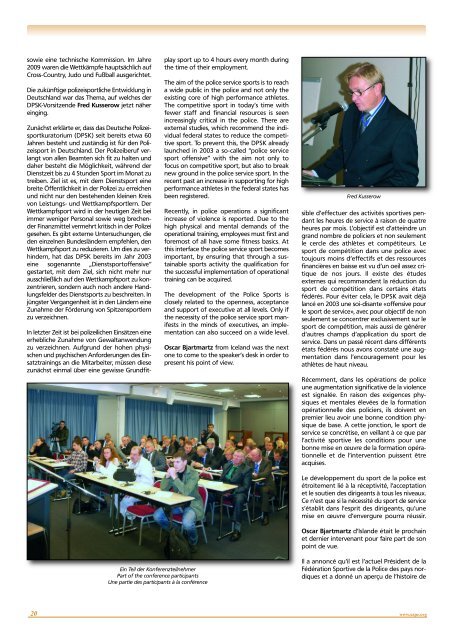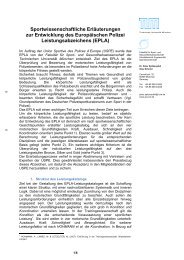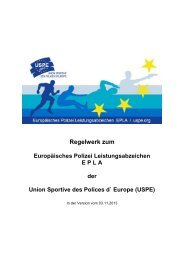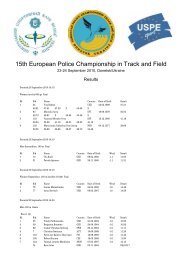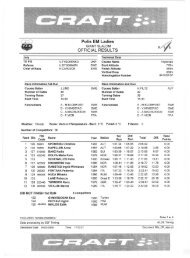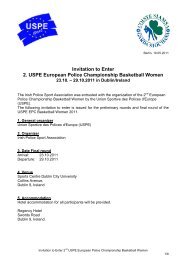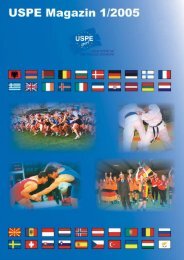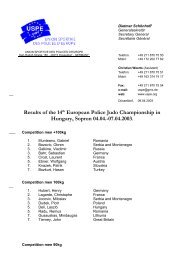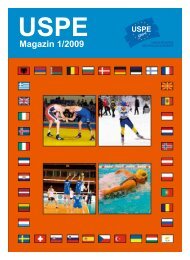Create successful ePaper yourself
Turn your PDF publications into a flip-book with our unique Google optimized e-Paper software.
sowie eine technische Kommission. Im Jahre<br />
2009 waren die Wettkämpfe hauptsächlich auf<br />
Cross-Country, Judo und Fußball ausgerichtet.<br />
Die zukünftige polizeisportliche Entwicklung in<br />
Deutschland war das Thema, auf welches der<br />
DPSK-Vorsitzende Fred Kusserow jetzt näher<br />
einging.<br />
Zunächst erklärte er, dass das Deutsche Polizeisportkuratorium<br />
(DPSK) seit bereits etwa 60<br />
Jahren besteht und zuständig ist für den Polizeisport<br />
in Deutschland. Der Polizeiberuf verlangt<br />
von allen Beamten sich fit zu halten und<br />
daher besteht die Möglichkeit, während der<br />
Dienstzeit bis zu 4 Stunden Sport im Monat zu<br />
treiben. Ziel ist es, mit dem Dienstsport eine<br />
breite Öffentlichkeit in der Polizei zu erreichen<br />
und nicht nur den bestehenden kleinen Kreis<br />
von Leistungs- und Wettkampfsportlern. Der<br />
Wettkampfsport wird in der heutigen Zeit bei<br />
immer weniger Personal sowie weg brechender<br />
Finanzmittel vermehrt kritisch in der Polizei<br />
gesehen. Es gibt externe Untersuchungen, die<br />
den einzelnen Bundesländern empfehlen, den<br />
Wettkampfsport zu reduzieren. Um dies zu verhindern,<br />
hat das DPSK bereits im Jahr 2003<br />
eine sogenannte „Dienstsportoffensive“<br />
gestartet, mit dem Ziel, sich nicht mehr nur<br />
ausschließlich auf den Wettkampfsport zu konzentrieren,<br />
sondern auch noch andere Handlungsfelder<br />
des Dienstsports zu beschreiten. In<br />
jüngster Vergangenheit ist in den Ländern eine<br />
Zunahme der Förderung von Spitzensportlern<br />
zu verzeichnen.<br />
In letzter Zeit ist bei polizeilichen Einsätzen eine<br />
erhebliche Zunahme von Gewaltanwendung<br />
zu verzeichnen. Aufgrund der hohen physischen<br />
und psychischen Anforderungen des Einsatztrainings<br />
an die Mitarbeiter, müssen diese<br />
zunächst einmal über eine gewisse Grundfit-<br />
20<br />
Ein Teil der Konferenzteilnehmer<br />
Part of the conference participants<br />
Une partie des participants à la conférence<br />
play sport up to 4 hours every month during<br />
the time of their employment.<br />
The aim of the police service sports is to reach<br />
a wide public in the police and not only the<br />
existing core of high performance athletes.<br />
The competitive sport in today’s time with<br />
fewer staff and financial resources is seen<br />
increasingly critical in the police. There are<br />
external studies, which recommend the individual<br />
federal states to reduce the competitive<br />
sport. To prevent this, the DPSK already<br />
launched in 2003 a so-called “police service<br />
sport offensive” with the aim not only to<br />
focus on competitive sport, but also to break<br />
new ground in the police service sport. In the<br />
recent past an increase in supporting for high<br />
performance athletes in the federal states has<br />
been registered.<br />
Recently, in police operations a significant<br />
increase of violence is reported. Due to the<br />
high physical and mental demands of the<br />
operational training, employees must first and<br />
foremost of all have some fitness basics. At<br />
this interface the police service sport becomes<br />
important, by ensuring that through a sustainable<br />
sports activity the qualification for<br />
the successful implementation of operational<br />
training can be acquired.<br />
The development of the Police Sports is<br />
closely related to the openness, acceptance<br />
and support of executive at all levels. Only if<br />
the necessity of the police service sport manifests<br />
in the minds of executives, an implementation<br />
can also succeed on a wide level.<br />
Oscar Bjartmartz from Iceland was the next<br />
one to come to the speaker’s desk in order to<br />
present his point of view.<br />
Fred Kusserow<br />
sible d’effectuer des activités sportives pendant<br />
les heures de service à raison de quatre<br />
heures par mois. L’objectif est d’atteindre un<br />
grand nombre de policiers et non seulement<br />
le cercle des athlètes et compétiteurs. Le<br />
sport de compétition dans une police avec<br />
toujours moins d’effectifs et des ressources<br />
financières en baisse est vu d’un oeil assez critique<br />
de nos jours. Il existe des études<br />
externes qui recommandent la réduction du<br />
sport de compétition dans certains états<br />
fédérés. Pour éviter cela, le DPSK avait déjà<br />
lancé en 2003 une soi-disante «offensive pour<br />
le sport de service», avec pour objectif de non<br />
seulement se concentrer exclusivement sur le<br />
sport de compétition, mais aussi de générer<br />
d’autres champs d’application du sport de<br />
service. Dans un passé récent dans différents<br />
états fédérés nous avons constaté une augmentation<br />
dans l’encouragement pour les<br />
athlètes de haut niveau.<br />
Récemment, dans les opérations de police<br />
une augmentation significative de la violence<br />
est signalée. En raison des exigences physiques<br />
et mentales élevées de la formation<br />
opérationnelle des policiers, ils doivent en<br />
premier lieu avoir une bonne condition physique<br />
de base. A cette jonction, le sport de<br />
service se concrétise, en veillant à ce que par<br />
l’activité sportive les conditions pour une<br />
bonne mise en œuvre de la formation opérationnelle<br />
et de l’intervention puissent être<br />
acquises.<br />
Le développement du sport de la police est<br />
étroitement lié à la réceptivité, l’acceptation<br />
et le soutien des dirigeants à tous les niveaux.<br />
Ce n’est que si la nécessité du sport de service<br />
s’établit dans l’esprit des dirigeants, qu’une<br />
mise en œuvre d’envergure pourra réussir.<br />
Oscar Bjartmartz d’Islande était le prochain<br />
et dernier intervenant pour faire part de son<br />
point de vue.<br />
Il a annoncé qu’il est l’actuel Président de la<br />
Fédération Sportive de la Police des pays nordiques<br />
et a donné un aperçu de l’histoire de<br />
www.uspe.org


